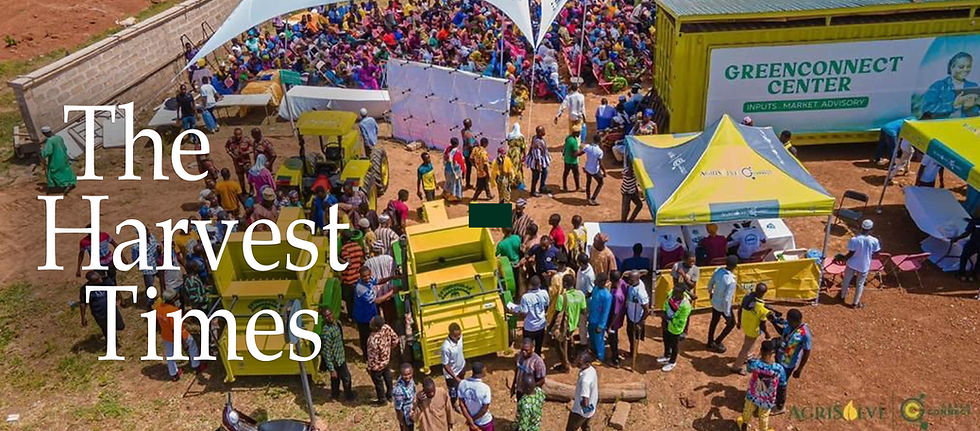The ‘Arms’ & ‘Legs’ of Agriculture – Meet Extension Specialist Lambert, a True-Blue Farmer at Heart
- Agrisolve
- Aug 3, 2023
- 3 min read
Updated: Aug 7, 2023
“I’ve been farming for 30 years. When I’m on the farm, it feels like a ‘release’. I exercise, stay active, it makes me look healthy. I think my body system likes that.”

When you truly enjoy your job, it shows – in your expression, energy, enthusiasm that you bring forth to it.
And it shows in Lambert Nkadinye’s face when he’s on the farm, explaining patiently and succinctly about the techniques he uses.
“When planting maize, it should be 75 by 20, meaning the spacing between rows should be 75cm while spacing between plants should be 20cm,” he explains.
Standing tall and sturdy, the 45-year-old of Sissalan tribe has been farming for 30 years. A true-blue farmer.
“When I’m on the farm, it feels like a ‘release’. I exercise, stay active, it makes me look healthy. I think my body system likes that,” he chuckles.
Lambert is presently an extension specialist with Agrisolve.
An extension officer plays a crucial role in the agriculture sector as they are the point-of-contact for farmers. They assess the needs of farmers and offer technical assistance and guidance in farming best practices.
Farmer School project via Demonstration Farms
Agrisolve’s “Farmer School” project trains and supports farmers on modern farming techniques, crop protection management, soil conservation and basic entrepreneurial skills.
It does so by setting up demonstration farms in various communities – showing farmers how produce such as maize and soya is planted, being taken care of, and how to measure agricultural input efficacy.
Think of it as a practical classroom training, with the classroom here being: the farm.
At the demo farm, Lambert says he mainly teaches farmers how to do row planting, apply fertilizers, and spray the fields with herbicides.
“I was a farmer before. I then went back to school – Wa Polytechnic – and studied agriculture engineering (mechanization), because I want to do better and deepen my knowledge of the sector,” he shares.
When asked on his experience teaching farmers, he said it’s not always smooth sailing.
“Some don’t patronize time. You ask them to come at a certain time, but they don’t. They might be late, or they don’t turn up,” he quips.
“It might be a cultural thing here. They may think other things are more important than learning to farm, like attending funerals.”
To address this issue, certain penalties have been put in place for non-attendance to encourage farmers to take the training seriously.
Challenges from degradation in soil facility, climate change
One significant change Lambert has observed in the past three decades is the degradation of soil fertility in the Upper West region of Ghana.
Unlike in the past when crops could grow without the application of fertilizers, modern farming now heavily relies on fertilizers for successful cultivation, Lambert says. “Now, crops here are used to fertilizers.”
Access to agriculture inputs is one of the biggest challenges farmers face here due to poor condition of roads and high prices on the market. To help tackle this, Agrisolve has set up Greenconnect Centers across various grassroot communities in northern Ghana to provide smallholder farmers with easier access and more affordable means to just that – seeds, fertilizers, herbicides, machinery services, and a marketplace (to sell their harvest).
A good gauge of what is deemed as good yield, he says, is when you can get 15 bags of maize – of 100 kilograms each – per acre.
However, climate change has also posed challenges, with erratic rainfall patterns affecting farming practices.
“The rain pattern has changed and fallen. Farmers are complaining because they don’t know what to do,” Lambert says.
According to the UN World Food Programme, agriculture in Ghana is mostly rain-fed, with less than 1 percent of cultivated land being irrigated. And the northern part of the country – which only has one rainy and planting season – is undergoing increasingly erratic rainfall with long dry periods.
“I’d always advise farmers to do early planting. And that they should practice using different varieties of crops. With this late rainfall, if you use late crops, it will help you. And if the rains are coming, you use early planting crops.”
Lambert Nkadinye, with his genuine interest and unwavering dedication for farming, continues to serve as the 'arms' and 'legs' of agriculture, as he helps farmers adapt to changing conditions and more efficient farming techniques.
(Cover photo L-R: Agrisolve's Extension Specialist Lambert Nkadinye and BD Officer Abdulai Is-hak Tuurosung at a Demonstration Farm in Funsi, Upper West Region of Ghana)



Comments